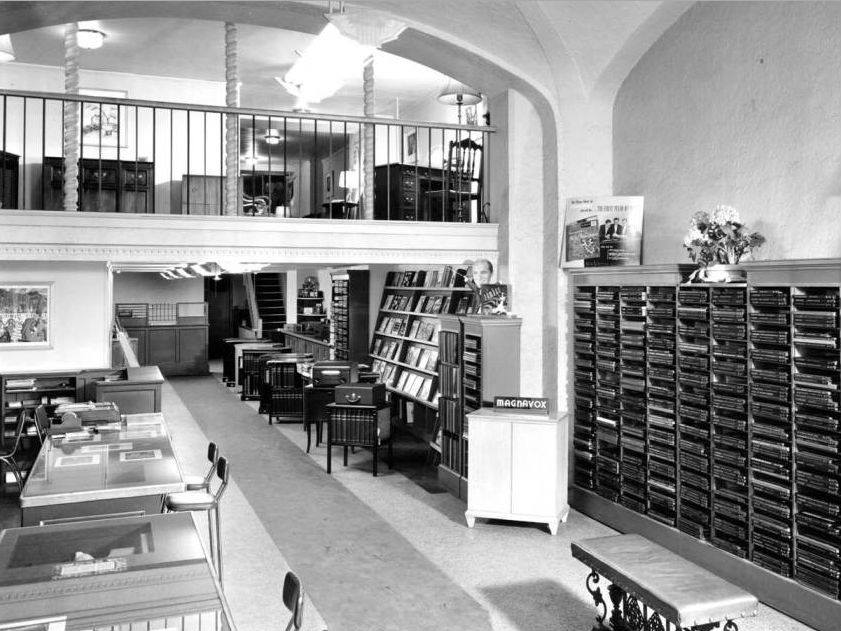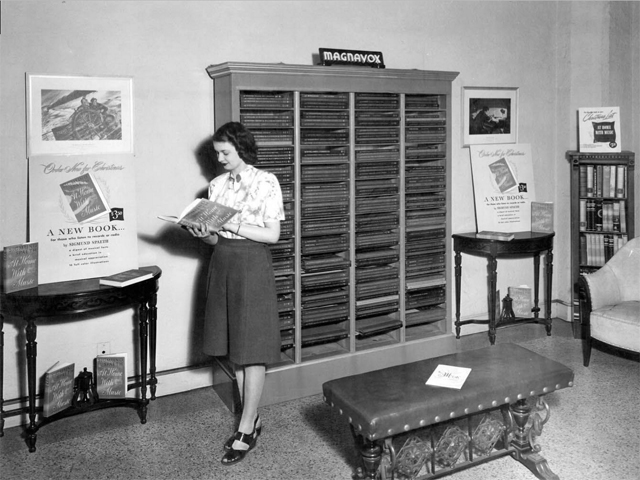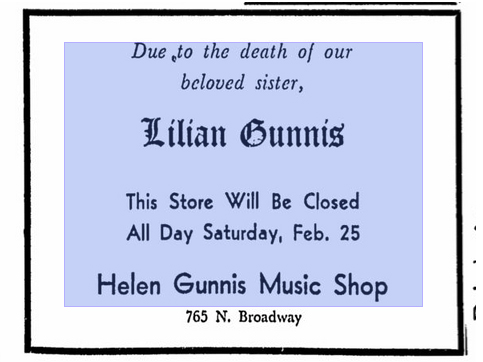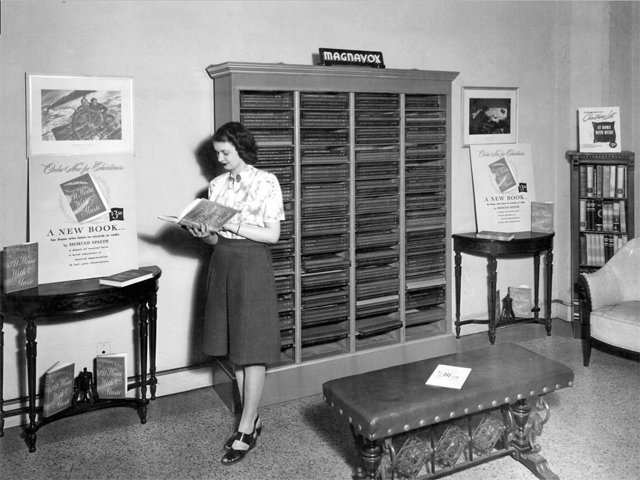Every generation has its favorite spots and for no one is that more true, perhaps, than for vinyl enthusiasts.
Of the places that have disappeared, one thinks of Atomic Records or, going back further, Radio Doctors. But, some of our parents or grandparents might think of the Helen Gunnis Music Shop, a successful business run by a pair of Milwaukee sisters.
Located at 765 N. Broadway, the shop sold records and phonographs and books about music. In time, the store became the city's premier outlet for classical music.

Helen Gunnis Music Shop, 1947. (Photo: Milwaukee Public Library)
Gunnis reportedly came to Milwaukee (perhaps from Chicago) to teach music at Milwaukee Public Schools and also sang with her sister Lilian as the Gold Dust Twins at the French-inspired Alhambra Theater for Samuel "Roxy" Rothapfel. Surely she played a role in Rothapfel's revival of the sagging Alhambra.
"Under Roxy's supervision," write Larry Widen and Judi Anderson in "Silver Screens: A Pictorial History of Milwaukee's Movie Theaters," "the three-thousand-seat theater became for a time the largest motion picture house in the world. Roxy installed a nursery for the convenience of matinee-going mothers, hired a staff of ushers, installed a projection booth, ordered new carpets and draperies, and covered the orchestra pit."
And, he hired the Gunnis sisters to sing what the Sentinel called "operatic airs and ballads of a high order."
When Rothapfel left the Alhambra, the sisters joined Hugo Bach's band and sang in parks, restaurants and in churches on Sunday mornings. On Sunday evenings they performed recitals at the Maryland Hotel, on 4th Street, just south of Wisconsin (razed in 1984).
Gunnis appears to have entered the record business by accident. In 1914, she was working as a stenographer at Gimbels and took a new job in the store's music department, ordering and selling music rolls. Later she moved to the music department at Schuster's on 12th and Vliet, then ran the record department at Fischer's (later called Klode's) furniture store and ultimately worked for the Edmund Gram Piano Co.
She opened her own shop with her sister Stella – who kept the accounts – in 1936.
"We rented a small store at 226 E. Mason St. (now home to Executive Edge Salon) for $75 a month," she told the Sentinel in 1967. "We thought we had taken the world on our shoulders. At first it was rough. Young people would buy records for 25 cents or 50 cents down, but we never lost a nickel. Then a miracle happened. From 1936 to 1938, there was an 800% national increase in record sales. The same men who had prophesied our doom now said that we were psychic."

The sisters weathered the difficult times during World War II and when it ended, they moved to the larger space pictured here.
According to Milwaukee Public Library, Helen Gunnis formed the Milwaukee chapter of the National Association of Record Dealers in 1949.
 A woman (apparently not a Gunnis sister) in the shop in 1947. (Photo: Milwaukee Public Library)
A woman (apparently not a Gunnis sister) in the shop in 1947. (Photo: Milwaukee Public Library)
By 1950 their shop had moved down the street to 630 N. Broadway. Shortly before the move, the Gunnis' lost their sister – and Helen's singing partner – Lilian.

The shop closed in 1958 after 22 years in business.
"Everyone thought we were crazy when we went into the record business in 1936," Helen Gunnis told the Milwaukee Sentinel in 1958, speaking about opening a music store during the Depression. "Even people in the trade were skeptical. But we had faith records would come back, and they did."
But in 1967, when the Milwaukee Sentinel's H.E. "Jamie" Jamison headed over to the Blackstone Apartments on Juneau and Van Buren to catch up with the Gunnis sisters for his "Jaunts With Jamie" column, they told a tale of woe that sounds eerily familiar to indie bookstore and record store owners in the Internet age:
"People would come into the shop, listen to a recording, write down the number and name of the label and then send to New York for it," said Stella. "This started the decline of shops dealing in classical records, not only in Milwaukee but across the country. The end came when the recording companies started record of the month clubs. We had to liquidate in 1958, we hadn't made a nickel in the last two years we were in business."
But Helen still viewed the experience contentedly.
"We had 22 years of fun and made a host of friends," she told Jamison.
Helen died in 1976 at age 86. Her sister Stella, whose birthday was day before Helen's, died in 1978 at the age of 90.

The 765 space is now occupied by Enterprise Credit Union and you can still see the balcony and a few other features of the space if you look very, very closely. I did just that a while back while snapping this photo and was a little surprised the credit union staff didn't seem more skeptical of my nosiness.
I was, however, a little saddened that no music was playing.
Born in Brooklyn, N.Y., where he lived until he was 17, Bobby received his BA-Mass Communications from UWM in 1989 and has lived in Walker's Point, Bay View, Enderis Park, South Milwaukee and on the East Side.
He has published three non-fiction books in Italy – including one about an event in Milwaukee history, which was published in the U.S. in autumn 2010. Four more books, all about Milwaukee, have been published by The History Press.
With his most recent band, The Yell Leaders, Bobby released four LPs and had a songs featured in episodes of TV's "Party of Five" and "Dawson's Creek," and films in Japan, South America and the U.S. The Yell Leaders were named the best unsigned band in their region by VH-1 as part of its Rock Across America 1998 Tour. Most recently, the band contributed tracks to a UK vinyl/CD tribute to the Redskins and collaborated on a track with Italian novelist Enrico Remmert.
He's produced three installments of the "OMCD" series of local music compilations for OnMilwaukee.com and in 2007 produced a CD of Italian music and poetry.
In 2005, he was awarded the City of Asti's (Italy) Journalism Prize for his work focusing on that area. He has also won awards from the Milwaukee Press Club.
He has be heard on 88Nine Radio Milwaukee talking about his "Urban Spelunking" series of stories, in that station's most popular podcast.







